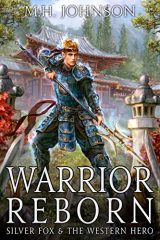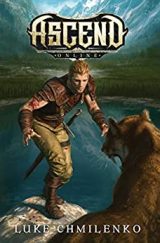Below are reviews of Web-novel inspired fiction from the Popadanets, isekai, and litRPG/GameLit genres respectively. For more on these genres, please check out “Here Be Dragons: The Web Novel’s Accidental Travels into Otherwhere”, which discusses these three common genres from the web novel branch of fiction.
 In M. H. Johnson’s Silver Fox & The Western Hero: Warrior Reborn, Alex, a billionaire’s son, attempts a desperate gamble to beat cancer. He volunteers to be cryogenically frozen until such time as a cure could be found, with his mind stimulated by an immersive MMO-like program while he sleeps. When he wakes up, Alex finds himself a barbarian in a Chinese fantasy thousands of years future that looks an awful lot like the past. To survive, he must master chi cultivation, even if it means drawing the attention of a trickster deity.
In M. H. Johnson’s Silver Fox & The Western Hero: Warrior Reborn, Alex, a billionaire’s son, attempts a desperate gamble to beat cancer. He volunteers to be cryogenically frozen until such time as a cure could be found, with his mind stimulated by an immersive MMO-like program while he sleeps. When he wakes up, Alex finds himself a barbarian in a Chinese fantasy thousands of years future that looks an awful lot like the past. To survive, he must master chi cultivation, even if it means drawing the attention of a trickster deity.
Warrior Reborn paints a light gloss of litRPG gaming elements over the currently popular chi cultivation and portal fantasy genres (xianxia and isekai) into a doorstopper novel. However, the litRPG elements are completely superfluous to the story, as Warrior Reborn quickly turns into a Ringoesque logistics opener focused on how Alex cleared his meridians to use the non-games mechanics skills of chi cultivation. This pursuit fills 75% of the doorstopper, which means that the conflict for the series is not revealed until the denouement. Warrior Reborn needs an aggressive editor wielding a cutting knife. There is, however, a lot of potential and charm here. The chinoiserie elements are immersive, not intrusive. The characterization is strong enough to carry the story over long stretches of exposition. And there are tantalizing hints to Alez’s lost adventures as a Watson to a trickster god’s Holmes. Hopefully the sequel will better balance exposition and adventure.
 The thirteenth volume of Aneko Yusagi’s Rising of the Shield Hero continues the adventures of the controversial hero. Naofumi Iwatani, the Shield Hero of the title, is an anti-hero summoned into a Dragon Quest-inspired blue-slime fantasy world from Japan. But it is not Naofumi’s often distasteful actions that has garnered the controversy, but the event that embittered him. For within days of his summoning to his new fantasy home, the princess of the realm falsely accuses him of rape. With his reputation sullied and dodging all the kicks he could ever want from the people he is supposed to protect, Naofumi is forced to rely on unsavory and immoral methods to keep himself alive long enough to face down the waves of monsters threatening the land. And, perhaps at the end of it all, go back home to Japan.
The thirteenth volume of Aneko Yusagi’s Rising of the Shield Hero continues the adventures of the controversial hero. Naofumi Iwatani, the Shield Hero of the title, is an anti-hero summoned into a Dragon Quest-inspired blue-slime fantasy world from Japan. But it is not Naofumi’s often distasteful actions that has garnered the controversy, but the event that embittered him. For within days of his summoning to his new fantasy home, the princess of the realm falsely accuses him of rape. With his reputation sullied and dodging all the kicks he could ever want from the people he is supposed to protect, Naofumi is forced to rely on unsavory and immoral methods to keep himself alive long enough to face down the waves of monsters threatening the land. And, perhaps at the end of it all, go back home to Japan.
Over the preceding twelve volumes, Naofumi has managed to scrape together a handful of companions, clear his name but not his reputation, and knock enough sense into the Spear, Sword, and Bow Heroes to get them to stop treating this isekai portal fantasy world like a video game. But when a neighboring country continues to send assassins after Raphtalia, the Shield Hero’s trusted companion–for admittedly minuscule levels of trust, Naofumi decides to travel to its capital to put his foot down. There, the Shield Hero finds that the government freely welcomes his arrival as an excuse to kick off a war. Now, to save Raphtalia and the citizens of this new land, Naofumi must overthrow the nobility before war and the next wave of monsters arrive.
Like Konosuba, Rising of the Shield Hero is a genre-savvy take on the saturated portal fantasy sub-genre. Instead of humor, Yusagi chooses a more realistic approach, exposing flaws in many isekai tropes, including slavery. Rather than soak Naofumi in unearned adulation, he receives unearned scorn, and the infinite blessings of most isekai heroes are now curses. Although Rising of the Shield Hero is billed as a revenge fantasy, it is instead the story of a spiteful man trying not to give into his rage as he still tries to do the right thing, even as he is too damaged to do it in the right way. The result brings restraint and actual moral complexity to what would otherwise be a standard power fantasy.
At thirteen volumes, the plot is starting to meander a bit. Naofumi’s confrontation with the power-mad noble who wants Raphtalia dead lingers for too long, and could have been condensed into a shorter, quicker tale. Which is a shame, as the translations are passable, with and ear and an eye to English readability instead of the often confusing line-by-line translations that are the standard for light novels. A reader can actually tell which character is saying what line of dialogue, which makes Rising of the Shield Hero an excellent introduction into Japanese light novels. Provided the reader can excuse Wheel of Time-style traveling fantasies and frequent diversions from the main plot.

Entertainment. In a world where basic needs are met, it is the final frontier for most people. So, when a new immersive game, Ascend Online, opens, Marcus and his friends log in to a new world that offers more challenges than their everyday lives. Such as Marcus being forcibly separated from his friends and sent to a town in the middle of goblin and spider invasions. Survival not only means leveling up, but building the town to withstand monster attacks–and marauding players–long enough for his friends to arrive.
Working in the same vein as Small Unit Tactics, Log Horizon, and Viridian Gate Online, Ascend Online is yet another of the guild management and progression fantasies that embody the main tropes of litRPG. And, to be quite fair, it almost comes close to being the sterling example of its genre, in the way that Bone Dungeon is for the dungeon builder novel.
Almost. The plot meanders compares to the more focused litRPGs, but where many indulge heavily in the minutia of leveling and crafting, Ascend Online tends to linger on its action scenes. Combat is frequent and blow-by-blow, padding the novel’s length to a door-stopping 650 pages. Less would be more for this formula-codifying novel, which otherwise balances likeability, characterization, exploration, and guild politics so well–and with far more grace than its copycats. But in its current state, Ascend Online is not quite the perfect introduction to the MMO-driven tales of litRPG. It’s merely close.
Please give us your valuable comment